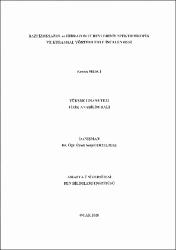Bazı izoksazol ve hidrazon türevlerinin spektroskopik ve kuramsal yöntemlerle incelenmesi
Özet
Bu tez çalışmasında, izoksazol ve hidrazon türevi iki bileşiğin yapısal özellikleri spektroskopik ve kuramsal yöntemler ile incelenmiştir. Moleküler yapıların spektroskopik analizleri FT-IR ve NMR teknikleri ile, kristal formlarının geometrileri, molekül içi ve moleküller arası etkileşimlerinin varlığı X-ışını kırınım analizi ile belirlenmiştir. Kuramsal analiz süreci Yoğunluk Fonksiyonel Teorisi (YFT), B3LYP fonksiyoneli ve 6-311G(d,p) baz seti ile gerçekleştirilmiştir. X-ışını kırınım analizi sonucu elde edilen moleküler geometrileri belirtilen kuramsal düzeyde optimize edilerek, bağ uzunluğu, bağ açısı ve torsiyon açısı gibi geometrik, titreşim frekansları, kimyasal kayma değerleri gibi bazı spektroskopik parametreleri incelenmiştir. Moleküler yapıların karakterizasyonları deneysel ve kuramsal analiz sonuçlarının birlikte değerlendirilmesi ile sağlanmış olup, her iki tekniğin birbirleri ile uyumlu sonuçlar verdiği belirlenmiştir. Ayrıca, moleküllerin öncü moleküler orbital (HOMO-LUMO) enerjileri, birtakım reaktivite parametreleri, moleküler elektrostatik potansiyel haritaları ve yük dağılımları kuramsal olarak incelenerek yapılara özgü özellikler belirlenmiştir. Kuramsal analizler Gaussian 09W paket programı ve GaussView 5.0 arayüz programları kullanılarak gerçekleştirilmiştir. In this thesis study, the structural properties of two compounds which are isoxazole and hydrazone derivative were investigated by spectroscopic and theoretical methods. The spectroscopic analyses of molecular structures were determined by FT-IR and NMR techniques, the geometry of crystal forms and the presence of intramolecular and intermolecular interactions were determined by X-ray diffraction analysis. The theoretical analysis process was carried out with Density Functional Theory (DFT), B3LYP functional and 6-311G(d,p) basis set. By optimizing the molecular geometries obtained from X-ray diffraction analysis of the structures at the specified theoretical level, geometrical properties such as bond length, bond angle and torsion angle, and some spectroscopic parameters such as vibration frequencies, chemical shift values were examined. The characterization of molecular structures was provided by evaluating the results of experimental and theoretical analysis together, and it was determined that both techniques gave compatible results with each other. In addition, frontier molecular orbital (HOMO-LUMO) energies, some reactivity parameters, molecular electrostatic potential maps and charge distributions of the molecules were examined theoretically and the properties specific to the structures were determined. Theoretical analyses were performed using the Gaussian 09W package program and GaussView 5.0 interface programs.
Bağlantı
https://tez.yok.gov.tr/UlusalTezMerkezi/TezGoster?key=4J_FzTwlrMCH4qBROpXPHz4iv4iyqNhatdVeT9IntS58mNhpPBChNESzGZ8j522Nhttps://hdl.handle.net/20.500.12450/1713
Koleksiyonlar
- Tez Koleksiyonu [397]


















